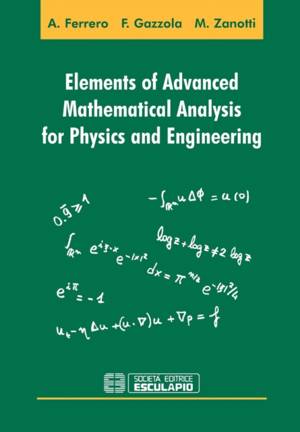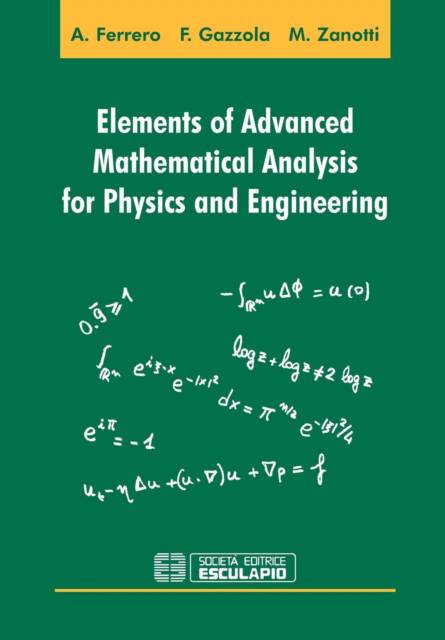
- Retrait gratuit dans votre magasin Club
- 7.000.000 titres dans notre catalogue
- Payer en toute sécurité
- Toujours un magasin près de chez vous
- Retrait gratuit dans votre magasin Club
- 7.000.0000 titres dans notre catalogue
- Payer en toute sécurité
- Toujours un magasin près de chez vous
Elements of Advanced Mathematical Analysis for Physics and Engineering
Filippo Gazzola, Alberto Ferrero, Maurizio Zanotti
Livre broché | Anglais
46,45 €
+ 92 points
Description
Deep comprehension of applied sciences requires a solid knowledge of Mathematical Analysis. For most of high level scientific research, the good understanding of Functional Analysis and weak solutions to differential equations is essential. This book aims to deal with the main topics that are necessary to achieve such a knowledge. Still, this is the goal of many other texts in advanced analysis; and then, what would be a good reason to read or to consult this book? In order to answer this question, let us introduce the three Authors. Alberto Ferrero got his degree in Mathematics in 2000 and presently he is researcher in Mathematical Analysis at the Universit`a del Piemonte Orientale. Filippo Gazzola got his degree in Mathematics in 1987 and he is now full professor in Mathematical Analysis at the Politecnico di Milano. Maurizio Zanotti got his degree in Mechanical Engineering in 2004 and presently he is structural and machine designer and lecturer professor in Mathematical Analysis at the Politecnico di Milano. The three Authors, for the variety of their skills, decided to join their expertises to write this book. One of the reasons that should encourage its reading is that the presentation turns out to be a reasonable compromise among the essential mathematical rigor, the importance of the applications and the clearness, which is necessary to make the reference work pleasant to the readers, even to the inexperienced ones. The range of treated topics is quite wide and covers the main basic notions of the scientific research which is based upon mathematical models. We start from vector spaces and Lebesgue integral to reach the frontier of theoretical research such as the study of critical exponents for semilinear elliptic equations and recent problems in fluid dynamics. This long route passes through the theory of Banach and Hilbert spaces, Sobolev spaces, differential equations, Fourier and Laplace transforms, before which we recall some appropriate tools of Complex Analysis. We give all the proofs that have some didactic or applicative interest, while we omit the ones which are too technical or require too high level knowledge. This book has the ambitious purpose to be useful to a broad variety of readers. The first possible beneficiaries are of course the second or third year students of a scientific course of degree: in what follows they will find the topics that are necessary to approach more advanced studies in Mathematics and in other fields, especially Physics and Engineering. This text could be also useful to graduate students who want to start a Ph.D. course: indeed it contains the matter of a multidisciplinary Ph.D. course given by Filippo Gazzola for several years at Politecnico di Milano. Finally, this book could be addressed also to the ones who have already left education far-back but occasionally need to use mathematical tools: we refer both to university professors and their research, and to professionals and designers who want to model a certain phenomenon, but also to the nostalgics of the good old days when they were students. ALBERTO FERRERO got his degree in Mathematics in 2000 and presently he is researcher in Mathematical Analysis at the Università del Piemonte Orientale. FILIPPO GAZZOLA got his degree in Mathematics in 1987 and he is now full professor in Mathematical Analysis at the Politecnico di Milano. MAURIZIO ZANOTTI got his degree in Mechanical Engineering in 2004 and presently he is structural and machine designer and lecturer professor in Mathematical Analysis at the Politecnico di Milano.
Spécifications
Parties prenantes
- Auteur(s) :
- Editeur:
Contenu
- Nombre de pages :
- 330
- Langue:
- Anglais
Caractéristiques
- EAN:
- 9788874886456
- Date de parution :
- 15-09-13
- Format:
- Livre broché
- Format numérique:
- Trade paperback (VS)
- Dimensions :
- 170 mm x 244 mm
- Poids :
- 526 g

Les avis
Nous publions uniquement les avis qui respectent les conditions requises. Consultez nos conditions pour les avis.






